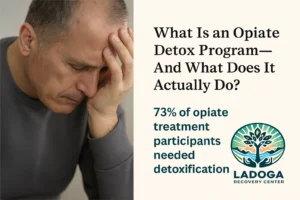Your child is using again. You feel it in your body before you see it in their behavior. The way they avoid your eyes. The familiar signs—the nodding off, the defensiveness, the money that can’t be accounted for. Maybe it’s their first relapse. Maybe it’s the fifth. Either way, it hits the same place in your chest: that heavy, helpless ache that asks, What now?
You’re not alone in wondering whether detox might be the thing that finally turns it around. And you’re not wrong to hope.
At Ladoga Recovery Center’s Opiate Detox Program in Indiana, we meet families every day who are caught in this moment—grieving, hoping, fighting not to give up. This blog is here to give you real answers, grounded in clinical experience, and framed by deep respect for the love you carry.
What Is an Opiate Detox Program—And What Does It Actually Do?
An opiate detox program is a short-term, medically monitored process designed to help someone withdraw from opioids safely. That includes substances like heroin, fentanyl, oxycodone, hydrocodone, and other prescription or synthetic opioids.
Detox focuses on one thing: stabilizing the body.
Opiate withdrawal can be brutal—nausea, shaking, bone-deep chills, overwhelming cravings, and mental distress. Without medical support, it’s not just miserable—it can be dangerous, especially for people with underlying health conditions or co-occurring mental illness.
At Ladoga, our opiate detox services offer:
- 24/7 medical supervision
- Comfort medications and symptom management
- A safe, supportive environment that protects dignity and privacy
But here’s the key: detox is the starting line. Not the finish line.
Can Detox Alone “Fix” My Child’s Addiction?
It’s a hopeful thought—and an understandable one. But the honest answer is no, detox alone doesn’t resolve addiction.
Here’s why:
- Detox clears the drug from the body.
- It does not address the reasons your child was using.
- It doesn’t build the coping skills, support systems, or therapeutic insight needed for long-term recovery.
Think of detox as a doorway. It opens access to healing—but your child still has to walk through it. And without continued care, that door often shuts again just as quickly.
Many clients relapse within days of detox if there’s no follow-up plan. That’s not failure—it’s how addiction works. The brain’s reward system, emotional pain, and old triggers don’t disappear when the substance does. But detox makes it possible to do the real work of healing.
Why Bother With Detox, Then?
Because detox can be life-saving. And in many cases, it’s the only way recovery can even begin.
Detox matters because:
- It interrupts the cycle of use long enough for your child to think clearly.
- It reduces cravings that make relapse feel inevitable.
- It gives clinicians a chance to assess physical and mental health needs.
- It creates a window—however brief—for hope to enter.
We’ve seen detox plant a seed that didn’t bloom until months later. We’ve seen a safe withdrawal experience change someone’s entire belief about what’s possible. It’s not everything—but it’s something. And sometimes, it’s the shift that makes everything else possible.
What Happens After Detox?
After detox, your child is no longer physically dependent on opioids—but they are still at high risk for relapse. This is when real treatment begins.
Depending on their needs, the next step might include:
- Residential treatment, for immersive structure and healing
- Partial hospitalization (PHP), offering full days of therapy with flexibility to return home
- Intensive outpatient programs (IOP), a lower time commitment with strong clinical support
- Medication-Assisted Treatment (MAT) using Suboxone or other medications to reduce cravings
- Outpatient therapy, peer support groups, or alumni programming
Each of these options builds on what detox starts. Together, they help your child develop the tools to stay clean—not just get clean.
At Ladoga Recovery Center, we provide referrals, transition support, and ongoing care planning. We never leave families hanging at the end of detox.

Is It Worth Starting Detox If My Child Won’t Commit to Treatment Yet?
This is one of the hardest questions a parent can wrestle with. You might feel like, If they’re not ready to commit, what’s the point?
But here’s the truth: readiness is not a fixed state. It evolves. Sometimes hour to hour. Detox can be the thing that sparks just enough clarity to shift that readiness forward.
We’ve seen clients go into detox just to get their families off their backs—only to have something break open once the fog clears. Sometimes it’s the first real night of sleep in months. Sometimes it’s a conversation with a nurse who listens without judgment. Sometimes, it’s just the absence of pain long enough to remember what hope feels like.
Don’t wait for perfect commitment. Start where you can.
What If This Isn’t the First Time?
Then we meet this moment for what it is: a return—not a reset.
Relapse doesn’t mean failure. It means something didn’t get healed the first time, or something new came up your child didn’t have tools for yet. Detox after a relapse still matters. It shows them that support isn’t conditional. That your love didn’t expire. That recovery is still an option.
Each detox is a chance to stabilize, to reassess, to rebuild differently.
How long does an opiate detox program last?
Most detox programs last between 5–10 days, depending on the substance used, how long they’ve been using, and any co-occurring medical issues.
Can I visit or stay with my child during detox?
Detox is usually a clinical environment with medical staff present 24/7. While visitation policies vary, most programs allow scheduled check-ins or calls depending on the client’s condition.
Will my child be forced into treatment after detox?
No one can be forced into treatment unless there’s a court order or psychiatric hold. But we will encourage and guide them—gently but clearly—toward next steps.
What if my child leaves detox early?
It happens. But even partial detox is safer than cold-turkey at home. And we’ll follow up with every available option to re-engage them if they walk out.
What makes Ladoga’s Opiate Detox Program different?
We treat the person, not just the symptoms. Our team offers compassion without judgment, medical care with dignity, and a deep commitment to supporting families—not just individuals.
You’re Not the Only One Asking These Questions
“How did we end up back here?”
“Is it even worth trying again?”
“What if nothing works?”
These aren’t questions of logic. They’re questions of heartbreak. And we won’t answer them with false hope or easy promises.
What we can say is this: every time a parent picks up the phone to ask about detox, something shifts. Every time you say, “I still believe in you,” even if it hurts—you create possibility.
If your child is using again, detox may not solve everything. But it might be the place where something begins.
You don’t have to do this alone. And your love still matters.
Ready to take the next step?
Call (888) 628-6202 or visit Ladoga’s Opiate Detox Program page to learn more about our services in Ladoga, Indiana.

